Amity University-Noida B.Tech Admissions 2026
Among top 100 Universities Globally in the Times Higher Education (THE) Interdisciplinary Science Rankings 2026
JEE Main Admit Card 2026- The National Testing Agency has issued the JEE Main 2026 admit card for Jan 28 & 29 exams on January 24, 2026. The download link for the JEE Mains session 1 admit card is available on the official website, jeemain.nta.nic.in. To download the hall ticket, aspirants need their JEE Main 2026 application number and password. The JEE Main exam centre and its address, allotted shift, exam date and guidelines will be printed therein. Students are required to carry the admit card to the exam centre to appear for the JEE Main 2026 exam. The JEE Main exam is being conducted on January 21, 22, 23, 24, 28 & 29, 2026.
Direct Link to Download JEE Main Admit Card 2026 for Jan 28 & 29
This Story also Contains
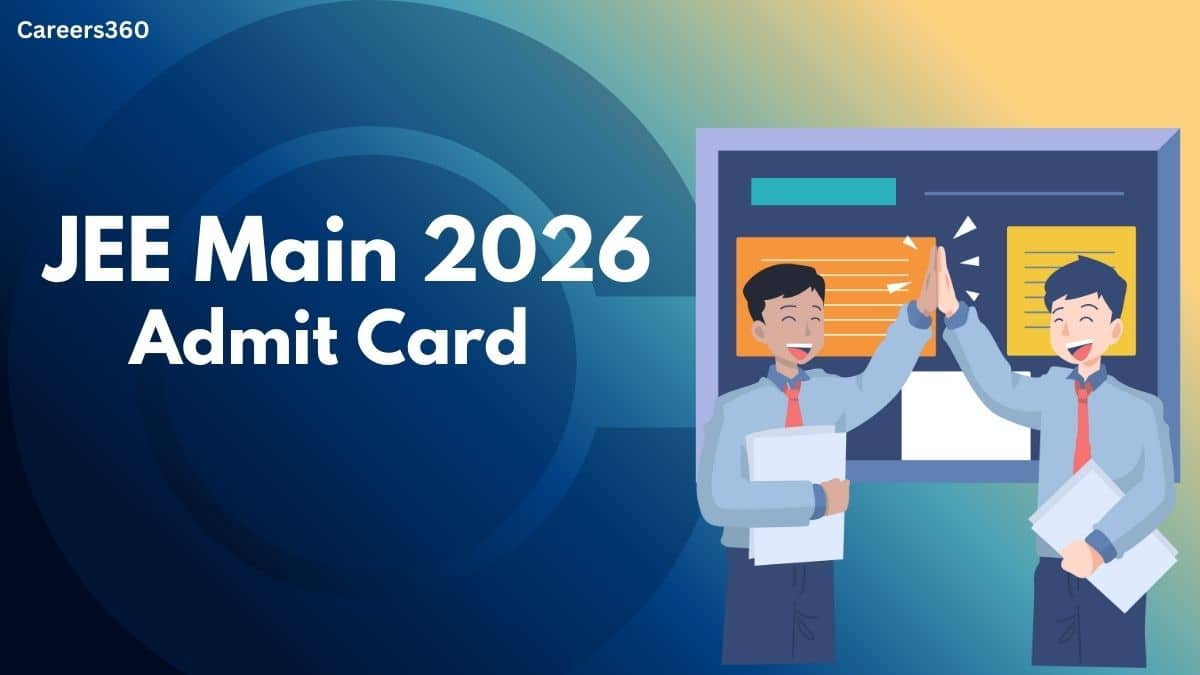
Check the full article for detailed information on the JEE Mains admit card 2026. It is important to download the document using the JEE Main 2026 admit card session 1 download link given in this article. Candidates must verify the details mentioned after downloading the hall ticket. In case of any error, they must immediately contact the officials for rectification. The JEE Main 2026 admit card link for session 2 will be released in the last week of March 2026.
Also Check: JEE Main Question Paper 2025
| Particulars | Details |
|---|---|
| NTA JEE Mains 2026 Admit Card Release Date | Session 1-
|
| JEE Main 2026 admit card download link | Active |
| Hall Ticket Release Time | After 5 PM |
| JEE admit card 2026 official website | jeemain.nta.nic.in |
| JEE Main admit card 2026 login details required | Application number and password |
| Details mentioned |
|
| JEE Mains 2026 Exam Date | Session 1- January 21, 22, 23, 24, 28 and 29, 2026 Session 2- |
Among top 100 Universities Globally in the Times Higher Education (THE) Interdisciplinary Science Rankings 2026
Last Date to Apply: 28th Feb | Ranked #43 among Engineering colleges in India by NIRF | Highest Package 1.3 CR , 100% Placements
The JEE Mains admit card 2026 release date for Jan 28, 29 is January 25, 2026. The JEE Main hall ticket 2026 release date is January 17, 2026, for Jan 21, 22, 23 and 24 exams. As per this year’s brochure, the National Testing Agency activates the JEE Main 2026 hall ticket link 3 to 4 days prior to the examination. Below are the JEE Mains admit card dates.
| Events | Date |
|---|---|
| NTA JEE Main Session 1 Admit Card Release Date | January 17, 2026 (For Jan 21 to 24 exams) January 24, 2026 (For January 28 to 29 exams) |
| Last Date to download the JEE Main hall ticket | January 27, 2026 |
| NTA JEE Session 1 Date | B.Tech- January 21, 22, 23, 24, 28, 2026 B.Arch - January 29, 2026 |
Recognized as Institute of Eminence by Govt. of India | NAAC ‘A++’ Grade | Upto 75% Scholarships
98% Placement Record | Highest CTC 81.25 LPA | NAAC A++ Accredited | Ranked #62 in India by NIRF Ranking 2025 | JEE & JET Scores Accepted
The session 1 JEE Mains 2026 admit card official website is jeemain.nta.nin.in. Only the successfully registered candidates are issued the JEE admit card 2026. The login credentials required for the JEE Mains admit card are the application number and password. Aspirants will also have to provide the correct CAPTCHA code and login.
The admit card of JEE Main 2026 session 1 for Jan 28 to 29 has been released on January 24, 2026. Only registered candidates can download the JEE admit card. Applicants must follow the steps mentioned below to download the NTA JEE Main admit card. The detailed JEE Main 2026 admit card download process is provided below.
Candidates need their JEE Main login credentials to download the admit card. To download the JEE Mains 2026 hall ticket, candidates require their application number and password. NTA activated the JEE Main session 1 admit card 2026 link on the website, jeemain.nta.nic.in. Candidates can access the JEE admit card online only.
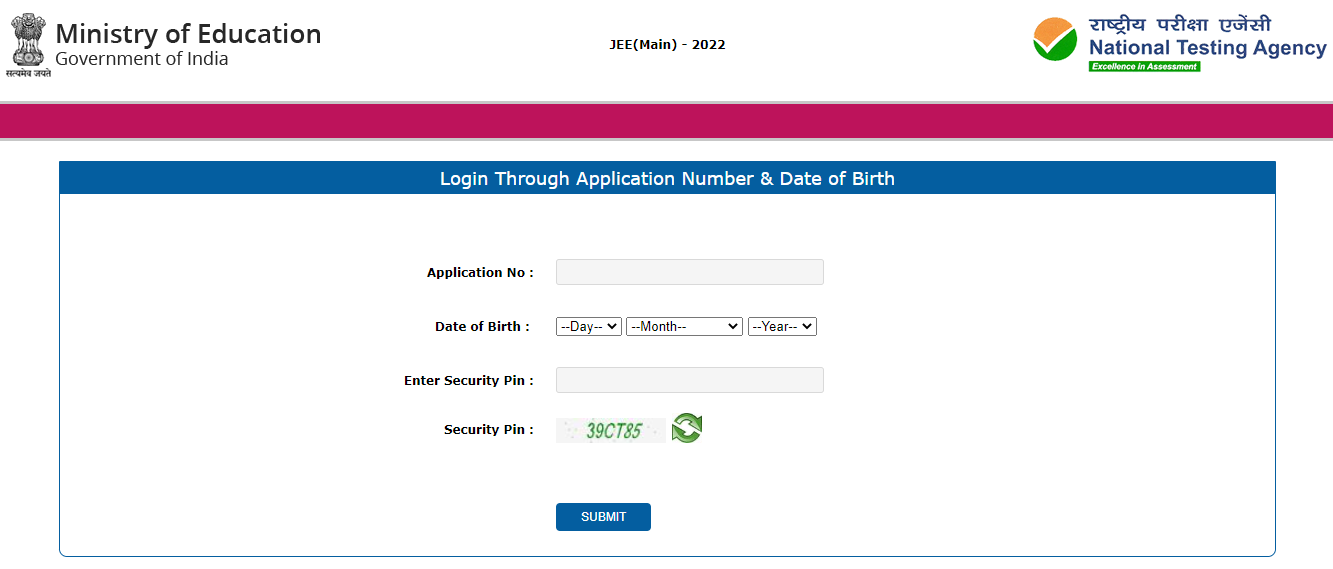
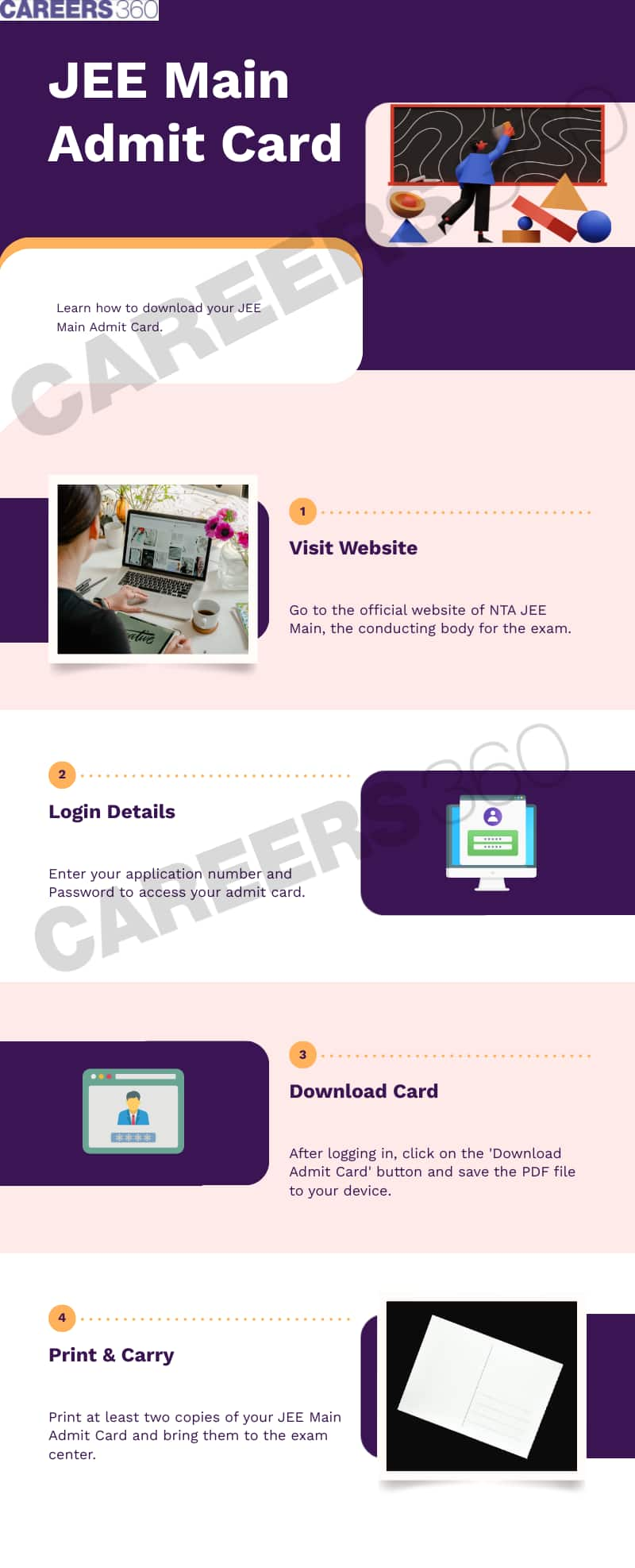
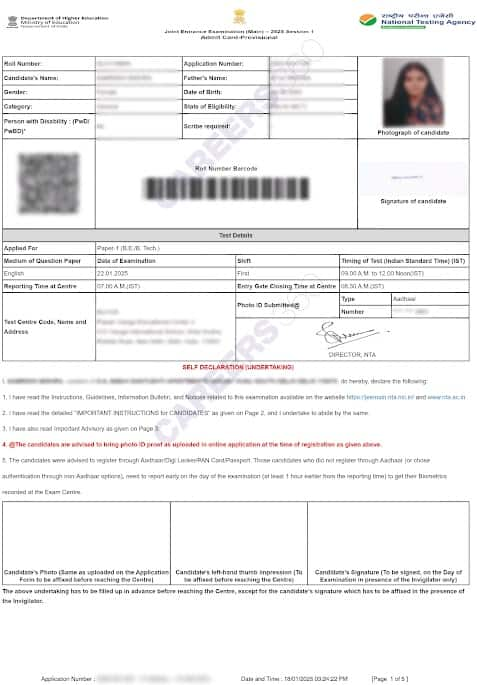
For those wondering how to check the JEE Main exam centres 2026, can find all the details in the JEE admit card. Candidates can check the following details in the NTA JEE Mains admit card :
The authority has mentioned the list of items allowed inside the exam hall on the JEE admit card 2026. Check the list of items that are allowed inside the JEE Main exam centre.
Candidates can refer to the JEE Main hall ticket for the list of prohibited items. Below is the list of prohibited items in the JEE Main exam centre.
Candidates appearing for the JEE Main exam have to follow a few exam guidelines. The authority mentions the complete guidelines on the JEE Main hall ticket. Below are a few important NTA JEE Main exam day guidelines to follow at the examination centre of JEE Main 2026.
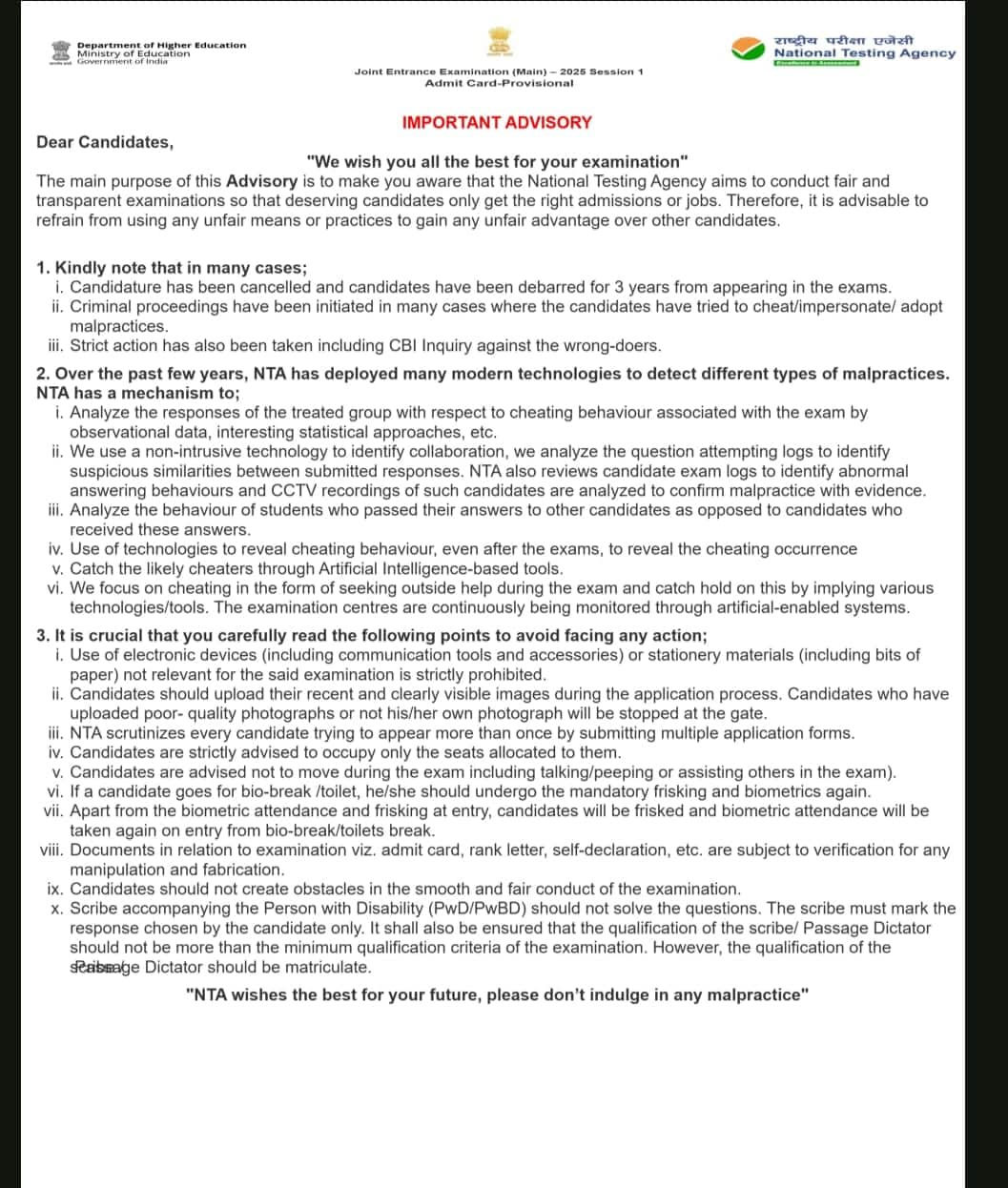
The JEE Main hall ticket also provides the details on the appropriate dress code for the exam. The JEE Main dress code 2026 is the correct attire that a candidate must wear when taking the exam. Here are certain points for reference-
Candidates must check their JEE Main admit card 2026 for any discrepancies. There may be a chance of discrepancies in the JEE Mains 2026 admit card related to name, date of birth, gender, exam centre, city, category, etc. Candidates must contact the mentioned authorities in case of discrepancies in the JEE admit card.
There may arise a case when the candidates forget their JEE application number. Students can follow the detailed steps below during such situations:
There is a chance of forgetting the JEE Main password. Below are the steps to retrieve the password to download the JEE Main 2026 admit card.
Candidates will not be able to download the old IIT JEE Main admit card. The JEE Main 2026 hall ticket download will available for download 3 to 4 days before the exam date. NTA JEE Main admit card will be available on the official website, jee main nta nic in 2026. Candidates need to provide the application number and password. After downloading the admit card, the candidate must take a printout of the same.
Candidates might face issues in downloading the JEE Main 2026 admit card. The problem in downloading the JEE admit card may occur due to slow internet connectivity or a technical error. If anyone is unable to download the JEE Main 2026 admit card, they can follow the given steps.
If the issue still persists, contact the JEE Main 2026 officials through the Contact No. 011-40759000 or email them at jeemain@nta.ac.in.
Related- JEE Main 2026 admit card link is showing a 503 error
The authority is expected to release the JEE Main Sessin 2 admit card in the fourth week of March. The dates will be updated below,
| Events | Date |
|---|---|
| NTA JEE Main Session 2 Admit Card Release Date | March 2026 (3 to 4 days before the exam) |
| Last Date to download the JEE Main hall ticket | April 2026 |
| NTA JEE Session 2 date |
The National Testing Agency has released the city intimation slip for session 1 on January 8, 2026, on the official website, jeemain.nta.nic.in. Aspirants can check the JEE Mains city intimation 2026 using the JEE login credentials, such as application number and password. The city intimation slip of JEE Main consists of the name of the test city where candidates have to appear for the exam.
Frequently Asked Questions (FAQs)
The session 1 JEE Main 2026 admit card release date is January 24, for Jan 28 and 29 exams.
Candidates can check the JEE Mains hall ticket for January 2026 session using the JEE login application number and password.
Candidates must carry the JEE Main 2026 admit card along with the self-declaration (undertaking) downloaded from the NTA website, printed on A4 paper and duly filled. A simple transparent ballpoint pen, an additional photograph for the attendance sheet, a personal hand sanitizer (50 ml), and a transparent water bottle are also required.
The credentials required to download the NTA JEE Main admit card 2026 are the application number and password.
Candidates can check the JEE Mains admit card 2026 to know the exam date, time and venue.
Candidates can select either of these web browsers namely Firefox and Chrome to access the JEE Main 2026 admit card link.
Apart from the admit card of JEE Main 2026, candidates can also carry sanitiser, ballpoint pen, a photograph, a transparent water bottle, masks, and gloves.
JEE Mains 2026 dates are January 21 to 29, for session 1 and April 2 to 9, for session 2.
If you forget your JEE Main application number or password, visit the official website jeemain.nta.ac.in and navigate to the "Contact" tab. On the login page, select either "Forgot Application Number?" or "Forgot Password?" to recover your credentials.
The session 1 admit card for JEE Main 2026 Jan 28, 29 has been issued on January 25, 2026.
On Question asked by student community
Approx 1 lakh to 3 lakhs as you are from a general category
There are many NITs that accepts JEE Main rank below 35,000 in different branches including Civil Engineering, Chemical Engineering, and many more. These NITs are -
Yes, based on previous years' trends, some of the good colleges that offer BTech admissions with JEE Main rank between 65,000–80,000 include:
Arnav Gautam & P.Mohith secured 300 out of 300 in JEE Mains session 1, as per the provisional answer key. The list of toppers to be released with JEE Main results
JEE Main 2026 session 1 result is not declared yet. JEE Main session 1 result will be declared on February 12.
Among top 100 Universities Globally in the Times Higher Education (THE) Interdisciplinary Science Rankings 2026
Recognized as Institute of Eminence by Govt. of India | NAAC ‘A++’ Grade | Upto 75% Scholarships
Highest CTC 44.14 LPA | UGC Approved | 1600+ Recruiters | 100% Placement
India's youngest NAAC A++ accredited University | NIRF rank band 151-200 | 2200 Recruiters | 45.98 Lakhs Highest Package
Last Date to Apply: 28th Feb | Ranked #43 among Engineering colleges in India by NIRF | Highest Package 1.3 CR , 100% Placements
NAAC A++ Grade | Recognized as Category-1 Deemed to be University by UGC | 41,000 + Alumni Imprints Globally